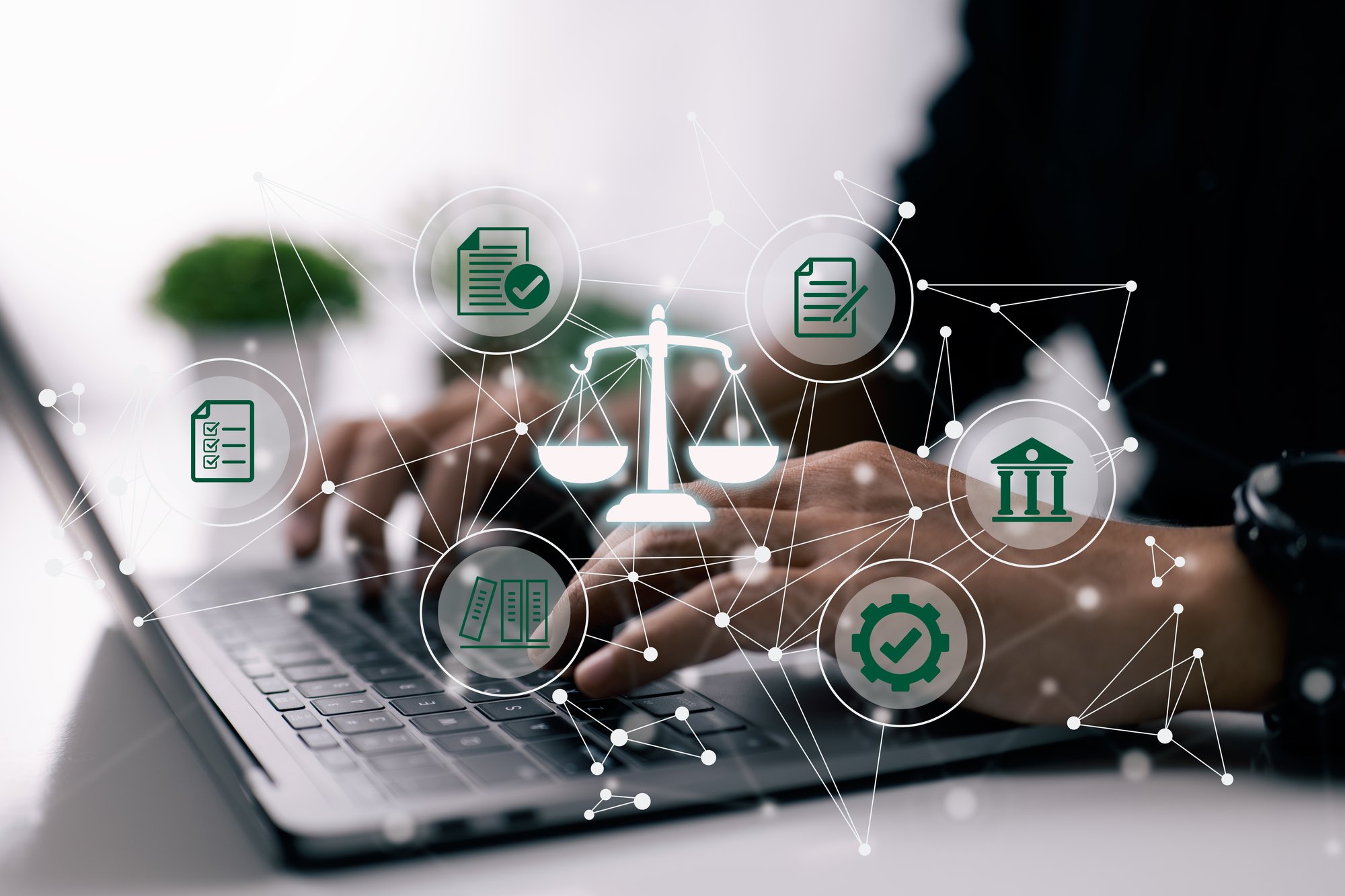Why Law Firms Need Advanced Cybersecurity
Law firms face a unique set of challenges. One of the most pressing is the need for advanced cybersecurity. Law firms are prime targets for cybercriminals. They handle sensitive data that, if compromised, can have severe consequences. The cost of a data breach can be substantial. It's not just about financial loss, but also the damage to a firm's reputation. Advanced cybersecurity for law firms goes beyond basic measures. It's about implementing robust systems that can withstand sophisticated attacks. So how can firms enhance their network security and comply with industry regulations? Let's discuss how to protect your law firm from cyber threats and ensure the confidentiality of your client data.

The Growing Threat Landscape for Legal Professionals
Law firms, in particular, are facing a growing number of cyber attacks. These attacks are becoming more sophisticated and harder to detect. The reasons for this increase are manifold. They include the rise of remote work, the use of personal devices for work, and the growing reliance on digital tools.
Here are some of the most common cyber threats law firms face today:
- Phishing attacks
- Ransomware attacks
- Insider threats
- Data breaches
- Network intrusions
Understanding these threats is the first step towards implementing effective cybersecurity measures.
Why Law Firms Are Prime Targets for Cyber Attacks
Law firms are attractive targets for cybercriminals. This is primarily due to the sensitive data they handle. Client information, case details, and financial data are all valuable to cybercriminals. If compromised, this data can be used for identity theft, fraud, or even corporate espionage. Law firms often have weaker security measures compared to other industries. This makes them an easier target for cyber attacks.
The High Cost of Data Breaches for Law Firms
Data breaches can have severe consequences for law firms. The financial impact alone can be devastating. Firms may face hefty fines for non-compliance with data protection regulations. They may also incur legal fees and costs associated with remediation efforts. But the cost of a data breach goes beyond finances. A firm's reputation can be severely damaged, leading to loss of client trust and potential business.
.jpg?width=1500&height=1000&name=hacker-woman-launching-cyberattack-bank-firewall-from-home-during-night-time-programmer-writing-dangerous-malware-cyber-attacks-using-performance-laptop-during-midnight%20(1).jpg)
The Essentials of Network Security for Law Firms
In the past couple of years as threats and attacks increase, network security emerges as a paramount concern for law firms. This critical facet of cybersecurity is not merely about erecting barriers; it's about safeguarding the very backbone of a law firm's operations - its IT infrastructure. Protection against unauthorized access and data breaches goes beyond the conventional; it demands a multifaceted strategy that can withstand the increasingly sophisticated threats. A comprehensive network security strategy is foundational, incorporating a layered approach designed to create a resilient and secure digital fortress. Firewalls serve as the first line of defense, filtering incoming and outgoing network traffic to block unauthorized access. Intrusion detection systems (IDS) work tirelessly, monitoring network traffic for suspicious activity that could indicate a breach, providing real-time alerts that enable swift action. Secure Wi-Fi networks are equally critical, ensuring that wireless communications are not the weak link in the security chain, protecting data in transit with robust encryption protocols. However, the deployment of these tools is just the beginning. Regular security audits and assessments are indispensable, acting as a diagnostic tool to uncover any vulnerabilities lurking within the firm's network. These assessments provide a roadmap for fortifying the network, identifying areas where security measures can be tightened to deter cybercriminals effectively.
Equally important is the establishment and maintenance of a clear, comprehensive cybersecurity policy. This living document should articulate the firm's approach to cybersecurity, detailing the protocols for data protection, incident response, and employee conduct regarding network use. Regular reviews and updates are necessary to ensure that the policy keeps pace with the ever-evolving threat landscape, incorporating new insights, technologies, and best practices to remain relevant and effective. You can download our free cybersecurity policy template to get started with your organization.
In essence, the journey toward robust network security for law firms is ongoing, requiring vigilance, adaptation, and a proactive stance. By embracing a holistic approach that includes advanced technological defenses, regular vulnerability assessments, and a dynamic cybersecurity policy, law firms can protect their IT infrastructure, safeguard their clients' sensitive information, and uphold the integrity of the client-attorney privilege.
Protecting Client-Attorney Privilege with Advanced Cybersecurity
The client-attorney privilege is a cornerstone of the legal profession. It requires law firms to maintain the highest level of data security. Advanced cybersecurity measures can help protect this privilege. These measures go beyond basic antivirus software and firewalls. They include encryption of sensitive data, multi-factor authentication, and a robust incident response plan. These measures can help prevent unauthorized access to client data and maintain the confidentiality of client communications.
The Role of Managed Services in Law Firm Cybersecurity
Managed services can play a significant role in law firm cybersecurity. These services offer specialized support and continuous monitoring of cybersecurity threats by a local MSP or Managed Service Provider like us. By outsourcing cybersecurity to a managed services provider, law firms can benefit from the expertise of cybersecurity professionals. This can be particularly beneficial for smaller firms that may not have the resources to maintain an in-house cybersecurity team. Moreover, managed services can provide proactive threat detection and response. This can help law firms identify and mitigate threats before they cause harm. Read more about managed services specifically for law firms.
Compliance and Legal Obligations in Cybersecurity
Compliance with industry regulations is a key aspect of cybersecurity for law firms. Non-compliance can result in legal penalties, including hefty fines. Law firms have an ethical obligation to protect client information. This extends to ensuring robust cybersecurity practices. In addition to legal and ethical obligations, law firms also need to consider the potential reputational damage caused by a data breach. Clients trust law firms with their most sensitive information, and a breach can significantly erode that trust.
Understanding Industry Regulations: HIPAA, GDPR, and Beyond
Navigating the complex landscape of data protection laws requires a detailed understanding of various jurisdictional requirements. Beyond HIPAA in the United States and GDPR in the European Union, there are numerous other regulations worldwide that law firms may need to comply with, depending on the nature of their practice and the geographical locations of their clients. For instance, the California Consumer Privacy Act (CCPA) introduces data privacy rights for residents of California, providing them with more control over the personal information that businesses collect about them. Similarly, in regions such as Asia-Pacific, laws like the Personal Data Protection Act (PDPA) in Singapore and the Privacy Act in Australia set forth stringent guidelines for data handling and privacy.
Each of these regulations has its own set of requirements and penalties for non-compliance. For example, under CCPA, businesses that fail to rectify a violation within 30 days of notification may be fined up to $7,500 per intentional violation. This highlights the importance for law firms not only to have a comprehensive understanding of these laws but also to implement tailored data protection strategies that ensure compliance across all jurisdictions they operate in.
Moreover, law firms must stay abreast of the ever-evolving nature of these regulations. Legislative bodies worldwide are continually updating and refining data protection laws in response to new challenges posed by technological advancements and shifting societal attitudes towards privacy. Implementing a dynamic compliance program that can adapt to these changes is essential for law firms to protect themselves and their clients effectively.
Understanding and complying with these diverse regulations also serves to reinforce a law firm's dedication to data protection, showcasing their commitment to ethical practices and client security. This not only helps in avoiding legal penalties but also in building and maintaining trust with clients, which is invaluable in the legal profession. As data breaches become more common, clients are becoming increasingly concerned about their data's security. Law firms that can demonstrate rigorous compliance with data protection laws are better positioned to attract and retain clients in this competitive landscape.
Implementing Advanced Cybersecurity Measures
Advanced cybersecurity measures go beyond basic antivirus software and firewalls. They involve a comprehensive approach to protect against both external and internal threats. One key aspect of advanced cybersecurity is the encryption of sensitive data. This includes data in transit, such as emails, and data at rest, such as stored client files. Another important measure is the regular auditing and assessment of the firm's security systems. This helps identify potential vulnerabilities and areas for improvement.
Encryption, Multi-Factor Authentication, and Incident Response
Encryption is a powerful tool for protecting sensitive data. It renders the data unreadable to anyone without the correct decryption key. Multi-factor authentication (MFA) adds an extra layer of security. It requires users to provide two or more forms of identification before accessing the system. This can help prevent unauthorized access. An incident response plan is also crucial. In the event of a breach, a well-prepared law firm can respond quickly and effectively, minimizing the damage and downtime. You can download our free cybersecurity planning template to get started with your organization.
Training and Policy: The Human Element of Cybersecurity
Cybersecurity is not just about technology. It also involves people and processes. Employees play a crucial role in maintaining the security of a law firm's network. Training staff on cybersecurity best practices is a critical component of a comprehensive security strategy. This includes teaching them how to recognize and respond to phishing attempts and other common threats. We offer a phish testing and training program for our clients. If you want to know more about this program and even try a month out for free, check out our page. A clear cybersecurity policy is also essential. This policy should outline the firm's security procedures and expectations for employees, and be regularly reviewed and updated.
Regular Cybersecurity Audits and Employee Training Programs
Regular security audits can help identify vulnerabilities within a law firm's network. These audits should be conducted by a qualified professional and include a thorough review of the firm's security measures. Employee training programs are another key aspect of a robust cybersecurity strategy. These programs should be mandatory and conducted regularly to keep staff up-to-date on the latest threats and best practices. Phishing simulations can be an effective training tool. They help employees recognize and respond to malicious emails, reducing the risk of a successful phishing attack.
It is imperative for law firms to have advanced cybersecurity protection.
Advanced cybersecurity is no longer optional for law firms. It's a necessity. The sensitive data law firms handle makes them prime targets for cybercriminals. Implementing advanced cybersecurity measures can protect a firm's data, reputation, and bottom line. It can also help maintain client trust, a crucial factor in the legal industry. In conclusion, law firms must prioritize advanced cybersecurity. It's not just about protecting data. It's about safeguarding the firm's future.
If you want to find out if our cybersecurity services are right for your firm, schedule a call to start the conversation.
Proud to be local. Areas we serve in Ohio:
Columbus Metro area including

Pickerington

Worthington

Dublin

Westerville

Gahanna

Downtown

Grove City

Hilliard
Outside of Columbus
Also providing remote Cybersecurity services throughout the Midwest.

Lancaster

Newark

Zanesville

Athens

Mansfield

Marion

Delaware

Celina

Coldwater

St. Mary's
Company news

What an IT Assessment Reveals (Real Examples)
Many business owners assume an IT assessment will simply confirm that “everything looks fine.”

Is My IT Company Doing Enough? 10 Signs You’re Being Underserved
If you’ve ever typed “Is my IT provider good?” into Google or asked an AI tool for advice, you’re...

Fun, Practical Ways to Use AI in Your Everyday Life
Artificial intelligence doesn’t have to be complicated, expensive, or just for big companies. Tools...
